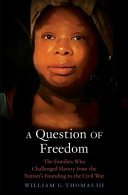A Question of Freedom: The Families Who Challenged Slavery from the Nationâs Founding to the Civil War

Top of the pile
94
/100
I Index Overall Rating

Readers
Critics
Scholars
N/A
Author:
William G. Thomas
Publisher:
Yale University Press
Date:
November 24, 2020
For over seventy years and five generations, the enslaved families of Prince George's County, Maryland, filed hundreds of suits for their freedom against a powerful circle of slaveholders, taking their cause all the way to the Supreme Court. Piecing together evidence once dismissed in court and buried in the archives, William Thomas tells an intricate and intensely human story of enslaved families, their lawyers, and the slaveholders, A Question of Freedom asks us to reckon with the moral problem of slavery and its legacies in the present day.
What The Reviewers Say
Jennifer Szalai,
New York Times Book Review
New York Times Book Review
The historian William G. Thomas III explains in A Question of Freedom the Dred Scott decision 'denied Black citizenship and gave slaveholders blanket authorization to take slaves into any state or territory in the United States.' It rejected the very idea that Scott was a legal person under the Constitution with standing to sue in the first place.
Fergus M. Bordewich,
The Wall Street Journal
The Wall Street Journal
Although [Thomas's] focus is comparatively narrow—the western shore of Maryland and Prince George’s County in particular (a part of Maryland that abuts Washington, D.C.)—he reveals a remarkable struggle for freedom, one buoyed at first by new aspirations in the broader culture and later doomed by rekindled fears.
Alison L. LaCroix,
The Washington Post
The Washington Post
In 1857, the chief justice of the United States, Roger Brooke Taney, declared in his infamous Dred Scott v. Sandford opinion that since the nation’s founding, African Americans — whether free or enslaved — 'had no rights which the white man was bound to respect.'.
Publishers Weekly
Thomas, a history professor at the University of Nebraska, debuts with a revelatory and fluidly written chronicle of attempts by enslaved families in Prince George’s County, Md., to win their freedom through the courts.















